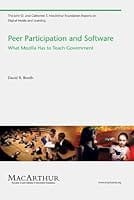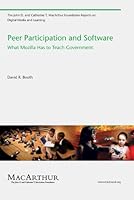Peer Participation and Software
Published:
Peer Participation and Software

Metadata
- Author: David R. Booth
- Full Title: Peer Participation and Software
- Category: #books
Highlights
- A company like Apple can build its latest operating system on the source code of BSD, an open source operating system, as a way of keeping pace with community-based innovations in this product category. If a software company goes out of business, the community still has the source code and can interface with other vendors and developers. Even if a vendor remains solvent, the community may avoid being locked into doing business with that vendor. (Location 180)
- For Mozilla, participation is the goal. Open source is a tool to engender that participation. (Location 192)
- A recursive public is a public that is vitally concerned with the material and practical maintenance and modification of the technical, legal, practical, and conceptual means of its own existence as a public; it is a collective independent of other forms of constituted power and is capable of speaking to existing forms of power through the production of actually existing alternatives. Free Software is one instance of this concept. . . . Recursive publics, and publics generally, differ from interest groups, corporations, unions, professions, churches, and other forms of organization because of their focus on the radical technological modifiability of their own terms of existence.12 (Location 203)
- In any public there inevitably arises a moment when the question of how things are said, who controls the means of communication, or whether each and everyone is being properly heard becomes an issue. A legitimate public sphere is one that gives outsiders a way in: they may or may not be heard, but they do not have to appeal to any authority (inside or outside the organization) in order to have a voice. Such publics are not inherently modifiable, but are made so—and maintained—through the practices of participants.13 (Location 213)
- Having a well-designed system by which individuals can contribute to the shared work of the group is essential to forging a recursive public. Without the ability to manage volunteer contributions quickly and cheaply, the sponsor organization can ill afford to support public participation. Experts and enthusiasts can ill afford to join a community without the mechanism to take effective action together. (Location 240)
- The number of people who participate may be small. The important thing is that when there is an issue you care about—and there may be only one or two issues that matter to you. The important thing is that you have the opportunity to participate. You have the option to be more than a consumer. You can create something when you need it. Most of the time, most of us won’t want to participate. Not everyone is involved all the time. But the option to get involved is fundamental. What’s important to us is that we have enough people getting involved when something is wrong.15 (Location 253)
- Brook’s Law: “Adding manpower to a late software project makes it later.”19 (Location 280)
- Linus’s Law: “Given a large enough beta-tester and co-developer base, almost every problem will be characterized quickly and the fix will be obvious to someone.” Raymond also states the same idea less formally: “Given enough eyeballs, all bugs are shallow.”22 (Location 304)
- “Distributed Decision-Making: Mozilla Modules and Module Ownership,” (Location 447)
- The MPL creates recursion. Its reciprocity provisions create return and an incentive to participate as a member of the community. (Location 556)
- Participants can document their experiences. By publishing their accounts online, participants can contribute to a community-wide knowledge base, one that can be organized by issue. Networked governance may be organized with Web pages. A Web page may serve as a portal to other online resources in other formats. (Location 641)
- In describing the challenges to implementing participatory governance, former CIO of the U.S. Department of Transportation Daniel Mintz writes: “The next administration will face two . . . challenges . . . first, how best to build a government organization that can tolerate failure, at least in small doses, and second, how to make a government agency or department organizationally agile.”51 (Location 675)
- Open source promotes experimentation. Open source tolerates failure. (Location 680)
- The Sunlight Foundation promotes transparency in the United States Congress by aggregating information for use by journalists and bloggers. (Location 687)
- While Mozilla software is licensed to ensure its free redistribution and modification, what is unique about the Mozilla Project is that it is both participatory and professional. (Location 781)
public: true
title: Peer Participation and Software longtitle: Peer Participation and Software author: David R. Booth url: , source: kindle last_highlight: 2014-09-12 type: books tags:
Peer Participation and Software

Metadata
- Author: David R. Booth
- Full Title: Peer Participation and Software
- Category: #books
Highlights
- A company like Apple can build its latest operating system on the source code of BSD, an open source operating system, as a way of keeping pace with community-based innovations in this product category. If a software company goes out of business, the community still has the source code and can interface with other vendors and developers. Even if a vendor remains solvent, the community may avoid being locked into doing business with that vendor. (Location 180)
- For Mozilla, participation is the goal. Open source is a tool to engender that participation. (Location 192)
- A recursive public is a public that is vitally concerned with the material and practical maintenance and modification of the technical, legal, practical, and conceptual means of its own existence as a public; it is a collective independent of other forms of constituted power and is capable of speaking to existing forms of power through the production of actually existing alternatives. Free Software is one instance of this concept. . . . Recursive publics, and publics generally, differ from interest groups, corporations, unions, professions, churches, and other forms of organization because of their focus on the radical technological modifiability of their own terms of existence.12 (Location 203)
- In any public there inevitably arises a moment when the question of how things are said, who controls the means of communication, or whether each and everyone is being properly heard becomes an issue. A legitimate public sphere is one that gives outsiders a way in: they may or may not be heard, but they do not have to appeal to any authority (inside or outside the organization) in order to have a voice. Such publics are not inherently modifiable, but are made so—and maintained—through the practices of participants.13 (Location 213)
- Having a well-designed system by which individuals can contribute to the shared work of the group is essential to forging a recursive public. Without the ability to manage volunteer contributions quickly and cheaply, the sponsor organization can ill afford to support public participation. Experts and enthusiasts can ill afford to join a community without the mechanism to take effective action together. (Location 240)
- The number of people who participate may be small. The important thing is that when there is an issue you care about—and there may be only one or two issues that matter to you. The important thing is that you have the opportunity to participate. You have the option to be more than a consumer. You can create something when you need it. Most of the time, most of us won’t want to participate. Not everyone is involved all the time. But the option to get involved is fundamental. What’s important to us is that we have enough people getting involved when something is wrong.15 (Location 253)
- Brook’s Law: “Adding manpower to a late software project makes it later.”19 (Location 280)
- Linus’s Law: “Given a large enough beta-tester and co-developer base, almost every problem will be characterized quickly and the fix will be obvious to someone.” Raymond also states the same idea less formally: “Given enough eyeballs, all bugs are shallow.”22 (Location 304)
- “Distributed Decision-Making: Mozilla Modules and Module Ownership,” (Location 447)
- The MPL creates recursion. Its reciprocity provisions create return and an incentive to participate as a member of the community. (Location 556)
- Participants can document their experiences. By publishing their accounts online, participants can contribute to a community-wide knowledge base, one that can be organized by issue. Networked governance may be organized with Web pages. A Web page may serve as a portal to other online resources in other formats. (Location 641)
- In describing the challenges to implementing participatory governance, former CIO of the U.S. Department of Transportation Daniel Mintz writes: “The next administration will face two . . . challenges . . . first, how best to build a government organization that can tolerate failure, at least in small doses, and second, how to make a government agency or department organizationally agile.”51 (Location 675)
- Open source promotes experimentation. Open source tolerates failure. (Location 680)
- The Sunlight Foundation promotes transparency in the United States Congress by aggregating information for use by journalists and bloggers. (Location 687)
- While Mozilla software is licensed to ensure its free redistribution and modification, what is unique about the Mozilla Project is that it is both participatory and professional. (Location 781)